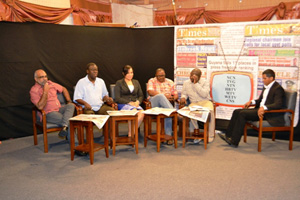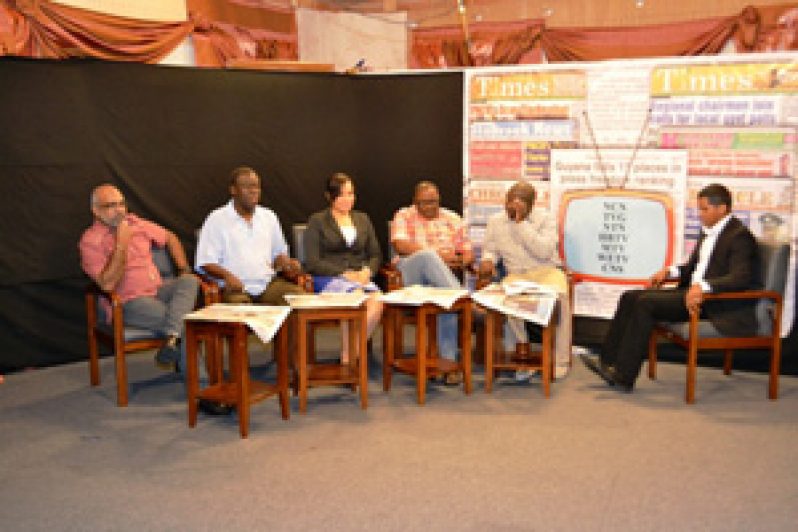 Moderator of the forum, Dario Mcklmon set the tone of the discussion by drawing reference to a recent report which showed that Guyana has dropped 11 places to 69 on the Press Freedom Index 2012-2013.
Moderator of the forum, Dario Mcklmon set the tone of the discussion by drawing reference to a recent report which showed that Guyana has dropped 11 places to 69 on the Press Freedom Index 2012-2013.Evolution
Information Liaison to the President, Mr Kwame McCoy, who begged to differ with the findings, said that at present, the media fraternity in Guyana is flourishing, which, in itself, is indicative of how far the country has come since the return of democracy following the October 5, 1992 election which saw the PPP/C take office.
He recalled that prior to 1992, there were many instances where media houses and practitioners were so cowed that journalists were mindful about speaking out against the then Administration for fear of reprisal.
“In Guyana today, we no longer have the situation whereby media houses are targeted for highlighting deficiencies within the Government,” McCoy said, adding that today, the high level of press freedom in Guyana is evident in the various articles, editorials and columns that are being published daily, particularly in the private media.
With reference to Guyana’s poor ranking on the Press Freedom Index, McCoy said some of the methods used to arrive at these rankings cannot be applied across the board, as each country has a unique scenario and as such the ‘one-shoe-fit-all’ approach will lead to skewed results.
NCN Chief Executive Officer (ag), Mr Michael Gordon supported McCoy’s argument that the media in Guyana has indeed matured in comparison to what obtained two decades ago. He said however that granted that the press is free, this freedom is not absolute, as it comes with its fair share of responsibilities.
He said that all too often, the private media project themselves as the bastion of press freedom, which is perhaps one of the greatest deceptions in the media fraternity.
Meanwhile, the lone female on the panel, Suelle Findlay-Williams from the Government Information Agency (GINA) spoke of the new forms of media which are becoming more and more popular today. However, she pointed out that the lack of responsibility can be sometimes distasteful.
She lamented those instances in which the media is used in a ‘tit-for-tat’ approach to assassinate people’s character.
Editor of the Kaieteur News, Adam Harris, who is a veteran in the media fraternity, spoke of the impact of technology on the local media, in that it is now much easier for people to set up media houses because of the significantly reduced cost of transmission.
According to Harris, the prescribed formula is, “Appreciate what John Public wants, and after you have done that, you must allow John Public to have a say.”
GINA’s Director, Neaz Subhan said the vast increase in media houses from 1992 to now is a clear indication that people are free. He pointed out that many of the people who decry suppression of press freedom are the ones who are the most vocal.
He said that while the media have upgraded in terms of adopting new technologies, the quality of today’s journalism has a far way to go.
Regulatory body
Much was said about the tendency of Kaieteur News to use its articles and columns to attack individuals. Mention was also made of the ongoing feud between the owners of the Kaieteur News and that of the Guyana Times, which is now imposed on the readers of these two print dailies.
McCoy noted that the media’s first and foremost responsibility is to serve the public by providing accurate and timely information. This role, he said, is lost on some media practitioners and as such, it is the public that suffers.
He disclosed that during the period August to December 2012, there were approximately 93 incidences of ‘mis-reportage’ in the Kaieteur. These came to light after they were identified by people based on what were the facts.
Subhan too, agreed that in reading sections of the Kaieteur News, it is clear that there is a direct attempt to use the paper to attack people’s character rather than providing information to the public.
It was agreed that there is need for a regulatory body for the local media that will bring sanctions on practitioners who cross the line and violate journalistic ethics. The mandate of this body however, should not, in any way, infringe on freedom of the press.
In July 2011, Government passed the Broadcast Bill in the National Assembly that sets out the rules and procedures for people to participate in an open and competitive broadcast sector. It also provides for the establishment of the Guyana Broadcasting Authority (GNBA), which is now up and running.
Guyana will join the rest of the world in observance of World Press Freedom Day on May 3. This occasion gives people the chance to pay tribute to media professionals who risked or lost their lives in the line of duty. (GINA)



.jpg)








